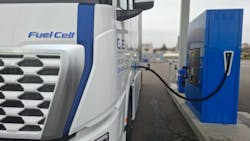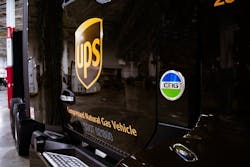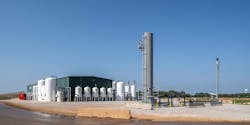Alt-fuel trucking continues growth, NACFE says
Key Highlights
- The trucking industry is still progressing alternative fuel accessibility and viability
- Natural gas powertrains are continuing to mature, especially for long-haul trucking, especially with the introduction of engines like the Cummins X15N
- Companies are still finding cost benefits and efficiency with alternative powertrains, creating continued interest in emissions reductions
The North American Council for Freight Efficiency is wrapping up its Run on Less Bootcamp Series with the insistence that alternative fuel vehicles and their infrastructure are well on their way, despite weaker support. Perhaps even enough now that it's less important to discuss which of the two needs to come first, thus avoiding the circular "chicken and egg" problem.
“We’re at the point now where there’s enough chickens and enough eggs out there that it’s irrelevant to the discussion,” Rick Mihelic, director of emerging technologies for the North American Council for Freight Efficiency, said during NACFE’s latest webinar.
Since February, the group’s bootcamp series shared presentations from 35 expert speakers, provided 13 hours of content, and hosted an average of 800 registrants per session. Themed after the abundant choice of alternative fuels in trucking today—what NACFE calls the “Messy Middle”—the bootcamp sessions highlighted significant growth in the alt-fuel space.
“We’re not talking about paper projects or some 2017 vision by some rich guy. We’re talking about real trucks being produced by all the traditional manufacturers,” Mihelic said. “It’s no longer theoretical; these things are really happening. The investment is being made, and progress is being seen.”
The tech is growing—despite weaker federal support
Though the current federal administration has little enthusiasm for supporting alternative powertrains, NACFE is finding that equipment and infrastructure development is keeping momentum.
“All these technologies needed some help to take baby steps to get off the ground,” Mihelic said. “What you’re finding is that those baby steps are behind them, and all these technologies are learning to walk now.”
The Trump administration is broadly removing financial incentives for alternative fuels and regulatory requirements for emissions reductions, significantly weakening the trucking industry’s demand for emissions reductions.
“The role of regulations, and a lot of the grants and incentives, is lessening,” Mihelic said. “You’re going to see all these alternatives have to compete on the same scale—and that’s going to make them more successful in the long run because they’re going to have to get cheaper, get lighter, and get better deployed.”
Despite the change in regulations and incentives, trucking still has many reasons to pursue emissions reductions. Fleet executives, their shareholders, or their shippers may be committed to reducing emissions; cutting fuel consumption still reduces one of the biggest for-hire operational costs; and many alternative fuels have the potential to outperform diesel in specific applications.
“Emissions reduction was a big driver for all these different alternatives,” Mihelic said. “But what I found in a lot of the interviews out in the field on Run on Less is that many of these companies are finding that it’s a competitive advantage; they’re finding cost reductions in using these new technologies. And that’s what the marketplace really wants.”
Natural gas for long haul is maturing
Natural gas powertrains have come a long way for Class 8 tractors.
“In 2010, when the 12 liters came out, they were somewhat underpowered in comparison to the diesels that they were going up against, and it kind of stunted the marketplace,” Mihelic said.
The launch of Cummins’ X15N, a 15-liter natural gas engine for heavy-duty tractors, was a watershed moment for long-haul natural gas powertrains. In addition to Paccar and Daimler Truck, other major manufacturers are including the engine in their trucks. J.B. Hunt and WM are among the major fleets embracing natural gas in their operations.
See also: How Cummins is tackling alternative fuels
According to the latest State of Sustainable Fleets report, registrations for Class 8 tractors running natural gas surged 50% in 2024 to 2,317 units.
“Natural gas finally has an engine that’s powerful enough to compete directly with the 15 liters and provide the same sort of performance, hill climbing, load carrying, and range capability,” Mihelic said. “It’s going to help natural gas tremendously.”
Cummins, a sponsor for this year’s Run on Less, joined Paper Transport, Energy Vision, and WM in one of NACFE’s Messy Middle bootcamp sessions to discuss the state of natural gas earlier this year.
In addition, biofuel production is booming and expected to continue growing at a rapid pace.
“The growth in the industry that’s producing renewable natural gas is huge,” Mihelic said, pointing out that 98% of freight operations still run on diesel. “They’ve got nothing but opportunity to expand significantly. The RNG marketplace doubling in the next few years from 400 to 800 facilities is still just a toe in the water; there’s a lot of room to grow.”
Hydrogen still has momentum
Mihelic voiced optimism for hydrogen as a future powertrain option for fleets.
Hydrogen production and distribution are still very promising. Seven major hydrogen hubs are likely still being developed across the nation, and the 45V hydrogen production tax credit survived the latest Republican tax bill.
Global hydrogen powertrain tech is also improving, with the joint venture between Daimler Truck and Volvo producing a power unit that could overcome long-haul range anxiety.
“One of my favorite sayings with hydrogen is that hydrogen truck people are flying the plane while they’re designing and building it. It is a rapidly evolving space where fueling is being constantly researched and improved, whether it’s gaseous or liquid.”
However, hydrogen trucking in the U.S. is still on very uncertain ground. Major hydrogen truck pioneers Nikola and Hyzon both filed for bankruptcy earlier this year, and future federal support seems bleak.
“Companies are investing in this technology irrespective of all the noise that’s going on in the political world,” Mihelic said. “It may get harder for some of these technologies to succeed; you may see some vehicle manufacturers stumble, as we saw earlier this last year, but others are stepping in to take their place.”
About the Author
Jeremy Wolfe
Editor
Editor Jeremy Wolfe joined the FleetOwner team in February 2024. He graduated from the University of Wisconsin-Stevens Point with majors in English and Philosophy. He previously served as Editor for Endeavor Business Media's Water Group publications.


